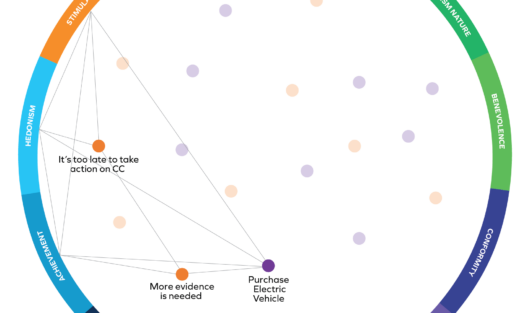

Values move people
The curious case of the EV
Values influence pro-environmental behaviour more than demographics
Climate Change is one of the greatest challenges we face.
And we know that there is a correlation between people’s likelihood to adopt pro-environmental behaviors and demographic characteristics. For instance, youth, education, a higher socio-economic status and living an urban setting all increase the likelihood of pro-environmental behaviors.
However, we found that the relationship between values and environmental behavior is twice as strong as demography.
But not the values you may think
We developed a Values Network to evidence the most meaningful relationships between different values, attitudes and pro-environmental behaviors.
Take the purchase of an EV. What values do you think most drive that decision? You can now explore what we found.


The values that drive these behaviours – not what you expect
While you might expect Universalism Nature to be the dominant value for the purchase of an EV, our analysis showed that Hedonism, Stimulation, Power and Achievement are much stronger.
Significantly, these values are also associated with climate-sceptic attitudes, including a desire for more evidence on climate change and a feeling that it’s too late to act.
This suggests that a significant group of consumers is motivated to purchase EVs because they are excited about their novelty and because they signal status – both virtue and wealth. Attempts to motivate this group to adopt EVs with appeals to protecting the environment will, therefore, fall on deaf ears.
Values-based engagement
Our understanding of how values move people is core to ’Values-based Engagement’ approach

BCW Age of Values 2023 Report
Read more about the world, its values and how they move people.
Download the Report